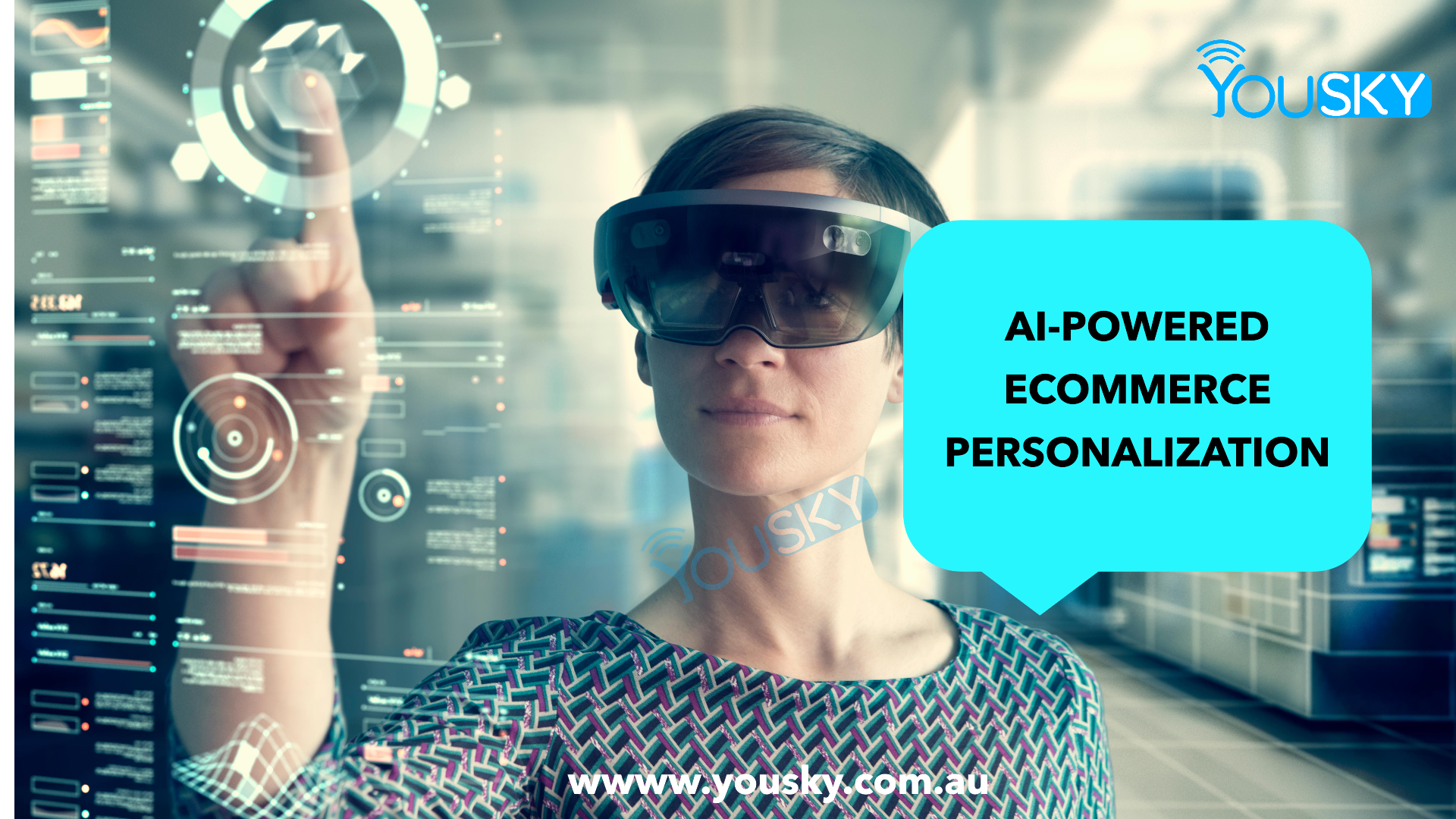
In the rapidly evolving landscape of e-commerce, one of the most potent tools at a retailer’s disposal is personalization. As consumer expectations continue to rise, driven by experiences on platforms like Amazon and Netflix, the demand for personalized shopping experiences has become paramount. This article explores how e-commerce businesses can harness the power of Artificial Intelligence (AI) to deliver personalized experiences that enhance customer engagement, increase conversion rates, and foster long-term loyalty.
Understanding E-commerce Personalization
E-commerce personalization involves tailoring the online shopping experience to individual preferences, behaviors, and characteristics of each customer. This customization goes beyond simple recommendations based on past purchases; it encompasses a holistic approach to delivering content, products, and offers that resonate with each shopper on a personal level.
The Importance of Personalization in E-commerce
1. Enhanced Customer Experience: Personalization creates a more relevant and enjoyable shopping journey, reducing friction and enhancing satisfaction.
2. Improved Conversions: By presenting products and content aligned with customer interests, e-commerce sites can significantly increase conversion rates.
3. Increased Customer Loyalty: Tailored experiences foster a sense of value and connection, encouraging repeat purchases and brand advocacy.
The Role of AI in E-commerce Personalization
AI plays a pivotal role in enabling sophisticated e-commerce personalization at scale. Machine learning algorithms analyze vast amounts of customer data in real-time to predict preferences, behavior patterns, and purchasing intent. Here are key ways AI enhances personalization:
1. Customer Segmentation and Targeting
AI algorithms segment customers based on demographics, browsing history, purchase patterns, and other relevant data points. This segmentation enables e-commerce platforms to deliver targeted messages, promotions, and product recommendations tailored to each segment’s preferences and needs.
2. Behavioral Analysis and Predictive Modeling
By analyzing browsing behavior, click-through rates, and purchase histories, AI can predict future actions and preferences with a high degree of accuracy. Predictive modeling helps e-commerce businesses anticipate customer needs and personalize their shopping experience in real-time.
3. Dynamic Pricing and Offer Optimization
AI-powered algorithms can dynamically adjust prices and personalize offers based on factors such as customer loyalty, purchasing history, and competitor pricing. This capability ensures competitive pricing while maximizing revenue and customer satisfaction.
4. Personalized Product Recommendations
AI analyzes customer preferences and behavior to generate personalized product recommendations. These recommendations are displayed prominently on the website, in email campaigns, and during checkout, guiding customers towards products they are likely to purchase.
5. Content Customization
From product descriptions to marketing emails, AI-driven content customization ensures that every interaction with the customer is relevant and compelling. This approach enhances engagement and encourages deeper exploration of products and services.
Implementing AI-driven Personalization Strategies
1. Data Collection and Integration
Effective personalization begins with robust data collection from multiple touchpoints such as website interactions, social media, and purchase history. Integration of this data into a unified customer profile is essential for AI algorithms to generate accurate recommendations and predictions.
2. Algorithm Selection and Training
Selecting the right AI algorithms depends on the specific personalization goals and data characteristics of the e-commerce business. Algorithms such as collaborative filtering, content-based filtering, and reinforcement learning are commonly used for recommendation systems and personalization strategies.
3. Real-time Personalization
AI enables real-time personalization by continuously analyzing customer behavior and adjusting recommendations and offers dynamically. This agility ensures that each customer interaction is relevant and timely, maximizing the likelihood of conversion.
4. Testing and Optimization
Continuous testing and optimization of AI models are crucial to improving personalization effectiveness over time. A/B testing different algorithms, content variations, and promotional strategies helps refine personalization strategies and achieve better outcomes.
Challenges and Considerations
1. Data Privacy and Ethics
Collecting and utilizing customer data for personalization must be done responsibly, adhering to data privacy regulations and respecting customer preferences for data usage.
2. Algorithm Bias and Fairness
AI algorithms must be monitored to mitigate biases that could impact the fairness and inclusivity of personalized recommendations and offers.
3. Scalability and Infrastructure
Scaling AI-driven personalization requires robust infrastructure and integration capabilities to handle large volumes of data and real-time processing demands.
Case Studies in Successful E-commerce Personalization
1. Amazon: Pioneer in Personalization
Amazon’s recommendation engine uses AI to personalize product recommendations based on past purchases, browsing history, and similar customer profiles. This approach significantly enhances customer satisfaction and loyalty.
2. Netflix: Personalized Content Recommendations
Netflix uses AI to analyze viewer behavior and preferences to recommend movies and TV shows tailored to each user’s taste. This personalized content discovery keeps users engaged and subscribed.
3. Sephora: Customized Beauty Experiences
Sephora uses AI-powered quizzes and customer preferences to recommend personalized beauty products and tutorials, creating a highly engaging and tailored shopping experience.
Future Trends in E-commerce Personalization
1. Advancements in Natural Language Processing (NLP)
NLP technologies will enable more sophisticated customer interactions through chatbots and voice assistants, delivering personalized recommendations and customer support.
2. AI-driven Visual Search
Visual search technologies powered by AI will allow customers to find products based on images, enhancing the accuracy and relevance of search results.
3. Augmented Reality (AR) for Personalized Experiences
AR will enable customers to visualize products in their environment, personalized to their preferences and specifications, enhancing the online shopping experience.
E-commerce personalization powered by AI represents a transformative opportunity for businesses to elevate customer engagement, drive sales, and build lasting relationships. By leveraging advanced data analytics and machine learning algorithms, e-commerce platforms can deliver seamless and personalized experiences that meet the evolving expectations of today’s digital consumers.
As technology continues to evolve, the key to successful e-commerce personalization lies in balancing innovation with ethical considerations and customer trust. Embracing AI-driven personalization strategies positions businesses at the forefront of the digital economy, driving competitive advantage and sustainable growth in the e-commerce landscape.
In the realm of e-commerce personalization, leveraging AI effectively can be a game-changer for businesses aiming to stay competitive and customer-focused. Yousky stands at the forefront of this technological frontier, offering tailored solutions that integrate seamlessly into existing e-commerce platforms. From advanced data analytics to AI-driven recommendation engines, Yousky empowers businesses to unlock deeper insights into customer behavior, streamline personalized marketing efforts, and ultimately enhance overall customer satisfaction and loyalty. By partnering with Yousky, businesses can harness the full potential of AI-driven personalization to create compelling and memorable shopping experiences that drive growth and differentiation in the digital marketplace.
To explore how Yousky can revolutionize your e-commerce personalization strategy, please contact us. Our team is ready to discuss tailored solutions that enhance customer engagement and drive business growth in the digital age.


